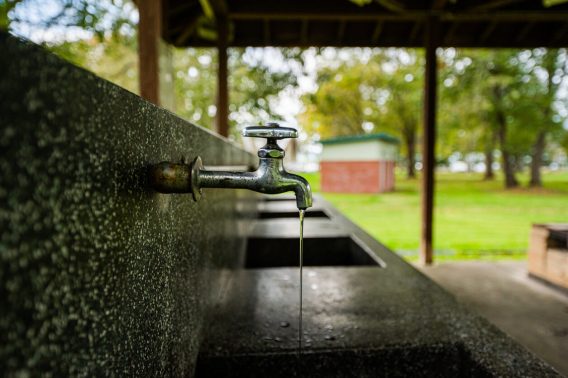PFAS in Water at Military Sites Far Exceeds Allowable Limits
Editors carefully fact-check all Drugwatch content for accuracy and quality.
Drugwatch has a stringent fact-checking process. It starts with our strict sourcing guidelines.
We only gather information from credible sources. This includes peer-reviewed medical journals, reputable media outlets, government reports, court records and interviews with qualified experts.

Newly identified water contamination at U.S. military bases shows PFAS levels exceeding the allowable limit, some by more than 100,000 times, according to the Environmental Working Group.
At least 455 locations were found to be contaminated with toxic PFAS, also called forever chemicals, according to new information from the U.S. Department of Defense. There are an additional 225 military bases suspected of potential contamination with carcinogenic chemicals, the EWG said.
“The Defense Department has failed to treat PFAS with the urgency service members and their families rightly deserve,” said Jared Hayes, a senior policy analyst at EWG. “For too long, people living in communities near military installations also have been the victims of the Pentagon’s failure to act.”
PFAS, or per- and polyfluoroalkyl substances, are called “forever chemicals” because they don’t break down naturally and can accumulate in the body and the environment, causing health risks.
Thousands of Military Members at Risk
In late 2022, the DOD estimated more than 175,000 service members and their families were subjected to unsafe water. The EWG estimates the number of people exposed to harmful water is closer to 600,000.
People at “24 military installations were served unsafe water containing PFOA and PFOS – the two most notorious PFAS,” according to the EWG. “That study only counted service members at installations served water with PFAS levels greater than 70 ppt [parts per trillion], the advisory level set by the Environmental Protection Agency in 2016.”
Earlier this year, the Environmental Protection Agency announced new drinking water limits for six PFAS, including PFOA and PFOS, at 4 ppt, far lower than the 2016 threshold. To get a sense of how small 4 ppt is, imagine four grains of sand inside of an Olympic swimming pool.
Military bases are known for using firefighting foam made with PFAS called aqueous film forming form, or AFFF, which the EWG states is the primary source of PFAS pollution at military bases. AFFF is used in training drills and to fight fires. It is toxic to humans and fish. Many people have filed AFFF lawsuits after claiming the toxic foam caused cancer and other serious illnesses.
Newly Identified Military Bases With PFAS Contamination
The top 20 newly identified water contaminated military sites range from over 2.6 million ppt at Joint Base Pearl Harbor to Fort Lee, Virginia, where contamination was detected at 10,000 ppt. The top five contaminated military sites are:
- Joint Base Pearl Harbor, Hawaii: 2,620,000 ppt
- Fort Stewart-Hunter Army Airfield, Georgia: 2,100,000 ppt
- West Bend Armory, Wisconsin: 871,000 ppt
- Fort Stewart, Georgia: 360,000 ppt
- Fort Sill, Oklahoma: 200,000 ppt
Exposure to PFAS can cause myriad health issues, including asthma, cancer of the prostate, kidney and testicles, developmental delays, high cholesterol levels, kidney damage, low birth weight, reproductive issues and thyroid and hormone disruption, among others.
The EPA announced in mid-August that an estimated 26 million people in America could have PFAS in their drinking water. Testing showed the presence of PFAS in 431 water systems, according to the EWG.
“For decades, millions of Americans have unknowingly consumed water tainted with PFAS,” said Scott Faber, senior vice president for government affairs at EWG. “The new testing data shows that escaping PFAS is nearly impossible. The EPA has done its job, and the Biden White House must finalize drinking water standards this year.”